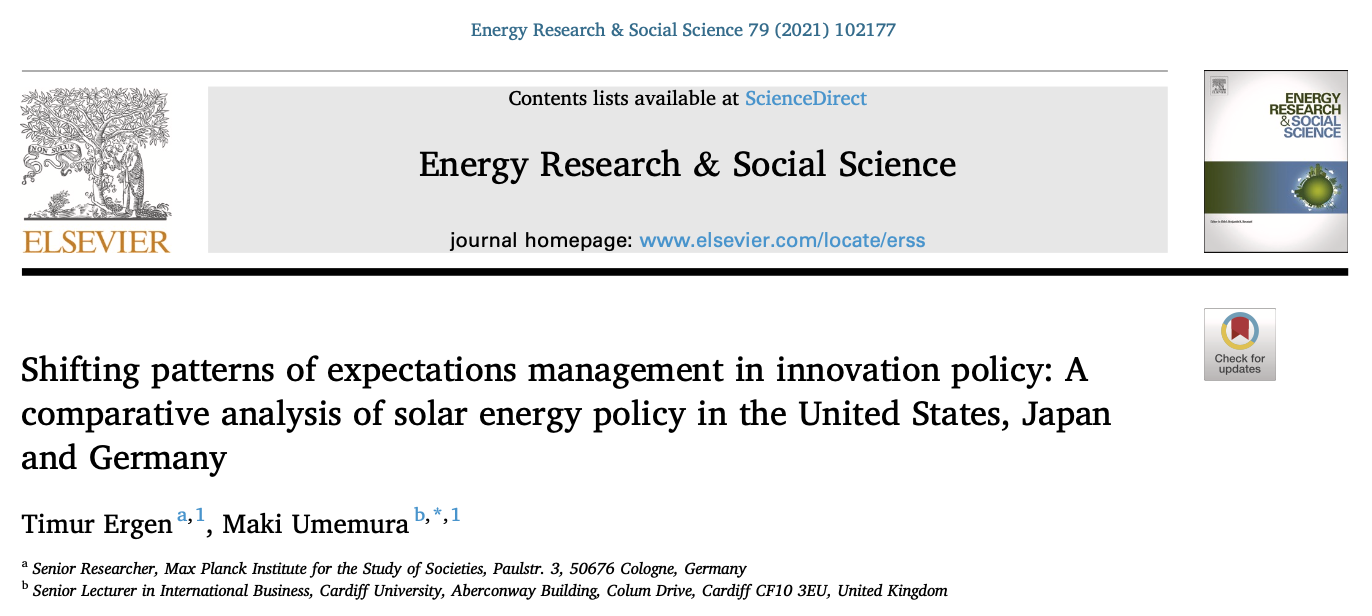Publication on Crisis Perceptions in Historical Social Research
A new paper in Historical Social Research on sense-making during the First Oil Crisis. ...
A new paper in Historical Social Research on sense-making during the First Oil Crisis. ...

The oil crisis of 1973/74 is commonly seen as the advent of state-led attempts to restructure rich societies’ energy infrastructures. Indeed, from a historical perspective, crises have repeatedly facilitated infrastructural transformations toward sustainability. But under what conditions can crises challenge existing orders and promote alternative infrastructures? Drawing on a historical vignette that reconstructs the public discourse emerging around the first oil crisis in the United States, this article proposes to reconsider the transformative potential of crises from a perspective focusing on the contested constitution of the future. We argue that the potential of crises to foster broader processes of infrastructural change is dependent on the capacity of actors to discursively challenge hopes and expectations inscribed in established infrastructures. As the example of the first oil crisis illustrates, crises are instances in which political actors engage in interpretative struggles to settle on whether disruptions present ‘real’ crises that require infrastructural transformation - or are mere accidents, errors, or irregularities that existent infrastructure can either withstand or requires only minor adaption as a result. In these discursive struggles, images of the future are contested on three layers: tangible experiences are linked to or detached from broader future consequences; potential causes are projected into the future or relegated to the past; and feasible future remedies are conceived or discarded. It is on these three layers of crisis discourse that the future is ‘opened up,’ and alternative infrastructures become conceivable.

This article builds on the literature on sociotechnical imaginaries and the sociology of expectations to engage in the discussion of how expectation alignment facilitates the development of novel technologies. While existing scholarship has elaborated on how expectations alignment is important to support technological development, it has not fully explored how the challenges of expectation alignment are translated into practices of expectation management and collective governance over the innovation process. Based on a range of archival sources, the article examines three historical episodes of photovoltaics development in locations that had spearheaded its development: the United States, Japan and Germany. Based on these historical episodes, the article suggests three core issues for the management of expectations in technological development: the creation, adaptation and materialization of shared imaginaries.

In this chapter, we discuss sociological analyses of expectations in the economy. Recognition of the social constitution of expectations advances the understanding of economic action under conditions of uncertainty and helps to explain key features of modern capitalist societies. The range of applications of the analytical perspective is illustrated by closer examination of three core spheres of capitalist societies: consumption, investment, and innovation. To provide an idea of crucial challenges of the approach, three research questions for the sociological analysis of expectations are presented.

Auf Basis der Rekonstruktion neo-pragmatistischer, bewegungstheoretischer und erwartungssoziologischer Argumente versuchen wir zu zeigen, dass Prozesse sozialer Sinnstiftung im zukunftsgerichteten Handeln helfen, nicht-institutionalisierte Kooperation zu erklärenDer Artikel entwickelt einen soziologischen Ansatz zum Verständnis der Rolle von Zukunftserwartungen im kollektiven Handeln. Er argumentiert, dass ein erwartungsbasierter pragmatistischer Ansatz Vorteile gegenüber etablierten sozialwissenschaftlichen Theorien in der Erklärung kollektiven Handelns in Episoden sozialen Wandels hat. Die Nützlichkeit der vorgestellten theoretischen Argumente illustriert eine Fallstudie zu technologischen Innovationen im amerikanischen Energiesektor.

Der Beitrag entwickelt eine pragmatistische Theorie technologischer Innovation. Anders als die Wirtschaftswissenschaften und der Mediendiskurs zum Unternehmertum, betont eine pragmatistische Perspektive die zentrale Rolle von Institutionen und kollektivem Handeln für die Entwicklung innovativer Problemlösungen. Somit erlaubt sie, das für die Entwicklung von technologischen Innovationen wichtige Wechselspiel zwischen Routinen, Irritationen und kreativem Handeln zu verstehen.
Together with Jens Beckert we contributed a chapter to a new Handbook of Economic Sociology for the 21st Century, edited by Andrea Maurer. The hardcover version has just arrived, so the ebook should be available soon. A preprint of our chapter has been published as an MPIfG discussion paper. ...
A new discussion paper in the MPIfG’s series on the role of the future in economic action with J. Beckert. A revised version will be published in the Handbook of Economic Sociology for the 21st Century (Springer Nature, 2020, edited by Andrea Maurer). ...

The paper compares technology policies for coal liquifaction and solar energy in the 1970s and 1980s. It argues that there’s a dilemma between commercializing specific technologies and supporting keeping technological options open.